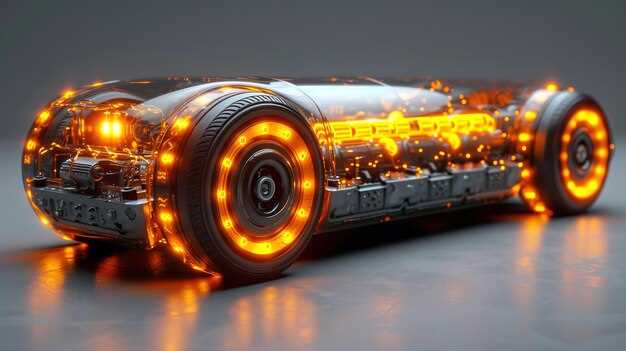
The world of NASCAR racing is on the brink of a revolutionary transformation as the organization embraces hybrid engine innovations. This shift represents not just a technological advancement, but a significant leap towards sustainability in the high-octane environment of professional racing. As the motorsport community grapples with growing environmental concerns, NASCAR’s integration of hybrid technology signals a critical move to modernize the sport while catering to the interests of a new generation of fans.
Hybrid engines, which combine traditional internal combustion with electric power, promise to enhance both performance and efficiency on the track. This innovation brings a new level of intrigue to the races, allowing teams to strategically utilize power management and boost performance when it matters most. As teams adapt their strategies to harness the benefits of hybrid technology, the dynamics of racing will undoubtedly evolve, curating a fresh narrative in NASCAR’s storied history.
Moreover, the introduction of hybrid engines aligns with broader automotive trends and reflects NASCAR’s commitment to remaining relevant in an ever-changing industry. The transition not only makes racing more exciting but also demonstrates NASCAR’s dedication to being part of the solution in reducing emissions and promoting cleaner technologies. With these advancements, the next era of NASCAR is set to redefine what it means to compete at the highest levels of racing, ensuring that the sport remains thrilling while paving the way for environmental responsibility.
How Hybrid Engines Will Change NASCAR Performance Dynamics

The integration of hybrid engines in NASCAR represents a significant shift in racing technology, promising to enhance both performance and efficiency. By combining traditional internal combustion engines with electric powertrains, hybrid systems can provide additional torque and horsepower during critical moments of a race, such as acceleration out of turns or during overtaking maneuvers.
This new approach not only potentially improves lap times but also allows teams to strategize their energy use more effectively. Drivers will have the ability to deploy electric power strategically, offering a fresh layer of tactics in racing. The combination of hybrid technology with aerodynamics and chassis design will enable teams to optimize their cars for various types of tracks and conditions, creating a more dynamic racing experience.
The Technology Behind NASCAR’s Hybrid Transition

The NASCAR series is embracing a significant technological shift towards hybrid engines, marking a pivotal moment in motorsport innovation. The incorporation of hybrid systems aims to enhance performance while reducing the environmental impact associated with traditional racing. At the heart of this transition is a sophisticated combination of internal combustion engines and electric powertrains, designed to optimize efficiency and speed.
NASCAR’s hybrid engines utilize advanced regenerative braking systems that capture energy normally lost during braking. This energy is then stored in batteries and can be deployed to provide additional power during acceleration. Such technology not only improves lap times but also contributes to fuel efficiency, allowing teams to compete with fewer pit stops.
Moreover, the integration of hybrid technology aligns with the growing demand for sustainable practices in sports. NASCAR’s commitment to hybrid engines demonstrates a forward-thinking approach that resonates with both fans and sponsors who prioritize environmental responsibility. The move not only positions NASCAR at the forefront of racing technology but also paves the way for future innovations in the sport.
As the racing community adapts to these changes, engineers and teams are continuously testing and refining hybrid systems. This ongoing development reflects NASCAR’s dedication to maintaining competitive integrity while embracing a greener future. The transition to hybrid engines signifies a crucial evolution in NASCAR, setting the stage for a new era of racing that balances performance with environmental stewardship.
Impacts of Hybrid Engines on Sustainability in Racing
Hybrid engines represent a pivotal shift in the NASCAR landscape, directly influencing sustainability efforts in motorsport. As the racing organization embraces these technologies, it aligns itself with global trends aimed at reducing carbon footprints and enhancing energy efficiency. The integration of hybrid systems allows for a significant reduction in fuel consumption, minimizing the overall environmental impact of racing events.
One of the major benefits of hybrid engines is their ability to harness regenerative braking technology. This feature not only recovers energy that would typically be lost during braking but also improves the performance of the vehicles on the track. By optimizing energy use, NASCAR can transition towards a more sustainable future without compromising on the excitement and competitiveness that fans expect.
Furthermore, hybrid technology encourages innovation within the industry. Manufacturers are driven to develop cleaner, more efficient engines which sets a precedent for sustainability across various automotive sectors. As these advancements are showcased in high-profile NASCAR events, they inspire broader adoption of similar technologies in consumer vehicles, thereby amplifying the impact beyond the racetrack.
Moreover, the implementation of hybrid systems helps to reframe public perception of racing. As NASCAR promotes its commitment to sustainability through the use of hybrid engines, it cultivates a positive image that resonates with environmentally conscious fans and sponsors alike. This shift not only enhances the brand’s reputation but also attracts a new generation of viewers who value green initiatives.
In conclusion, the adoption of hybrid engines in NASCAR is a transformative step towards a sustainable future in racing. By reducing emissions, fostering innovation, and reshaping public perception, NASCAR is setting a benchmark in the motorsport world for environmentally responsible practices while maintaining the thrill of competition.
